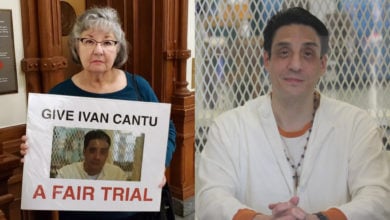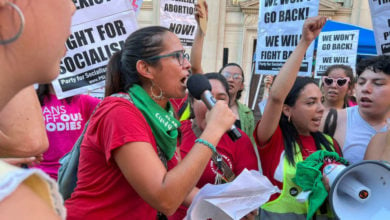The current Texas legislative session has been defined by a full-on assault on oppressed communities and social movements. Governor Greg Abbot bragged that in the span of 48 hours, the Texas legislature passed some of the most right-wing and restrictive bills in the country. The legislature has either proposed or passed at least a dozen bills that specifically target the most oppressed and marginalized communities in the state of Texas. Here is a roundup of some of the more sinister bills and where they currently stand.
Anti-transgender SB 1646 and SB 29 (stalled by Dems) – Trans rights are under increasing attack with a slew of anti-trans bills, not just in Texas but across the country. SB 1646 stated that gender confirmation surgeries for minors will be classified as a form of child abuse. It targeted physicians who prescribe or perform gender reassignment procedures for punishment. SB 29 would have restricted trans athletes from participating in sports and would force them to compete based on gender assigned at birth. Democrats were able to stall these bills to prevent them from passing.
Anti-civil rights SB 7 (prevented from passing by lack of quorum) – SB 7, drawing in part from conspiracy theories about “voter fraud” in the 2020 election, severely targets voter rights. The bill prohibits election officials “from proactively mailing out absentee ballots or applications for them.” It would make it far harder for election officials to remove partisan “poll-watchers.” Organized right-wing “poll watcher” groups inspired by Donald Trump engaged in voter intimidation in several states during the 2020 election. Under the bill, officials who provide assistance to voters in an arbitrarily determined “violation of the rules” are hit with new and more severe penalties. Texas is already one of the hardest states to vote in, and these laws will only further limit access to voting rights for oppressed people.
Anti-police reform HB 1900 (sent to governor’s desk) – HB 1900 takes aim at one of the core demands of last year’s uprising against police violence, the call to defund the police. Under the bill, any city that spends less of its budget on policing than the year before in any given year will be defined as having “defunded the police” and could be cut off from major parts of its tax revenue. This would also enable areas of some cities — such as Austin, which reduced its police budget in 2020 — to break away from the city. The bill would only apply to cities larger than 250,000 people, 11 Texas cities in total. This was sent to the governor’s desk on May 28.
Anti-homeless HB 1925 (sent to governor’s desk) – This bill would make “public camping” a Class C misdemeanor punishable with a fine of up to $500. Since “public camping” refers almost exclusively to homeless encampments, and homeless people do not have money to spare, the bill threatens to bring homeless people into an even more vicious cycle of interactions with police and incarceration. This was also sent to the governor’s desk on May 28.
Anti-protest HB 9 (sent to governor’s desk) – HB 9 would categorize obstructing a roadway as a state jail felony if the obstruction also prevented the passage of an emergency vehicle or blocked a hospital entrance. Currently, the act is a misdemeanor, carrying a penalty of up to six months in jail. A state jail felony could carry with it a punishment of up to two years in Texas state prison and designation as a felon for life. This “obstructing a roadway” charge, while couched in the language of “public safety,” is a blatant attempt to criminalize peaceful, First Amendment-protected demonstrations that enter roadways, as many did in Texas last summer. Those convicted must spend at least ten days in jail regardless of whether they are sentenced to probation. The Senate voted to send this to the governor’s desk on May 22.
Anti-history, anti-education HB 3979 (revived in Senate) – HB 3979 would effectively bar teachers in public education from discussing the effects of racism, sexism and white supremacy in the history of the United States. The bill states that teachers are not allowed to discuss the concept that “an individual’s race or sex, bears responsibility for actions committed in the past by other members of the same race or sex.” It also states that educators should not feel compelled to take professional training regarding issues surrounding cultural proficiency and equity if it causes them to feel “discomfort, guilt, anguish, or any other form of psychological distress.” Undoubtedly, the bill would render ineffective and optional even the modest cultural sensitivity trainings that currently exist in Texas. While the bill was initially killed by House Democrats, it has been revived in the Senate and may still reach the governor’s desk.
Anti-abortion SB 8 (signed into law) – This bill effectively outlaws abortion just six weeks into a pregnancy, before most people know they are pregnant. This is in clear violation of Roe v. Wade, which prohibits states from banning abortions earlier than 24 weeks into a pregnancy (before fetal viability). It would allow any citizen to file civil lawsuits against doctors, hospital staff, counselors, clergy, and even the friends and family of patients who drive them to the hospital for the procedure. Anyone involved with an abortion could be forced to pay up to $10,000 in fines. This was signed into law on May 19, amidst large protests across the state.
Why is this happening and how can we fight back?
The Texas legislature usually tosses around highly reactionary bills, but this session was far more intense. This is because the strength of constant and popular social movements over the last year has shaken the foundations of American capitalism, and its representatives in Texas, to its core.
Last year’s uprising against police brutality, the militancy of LGBTQ struggles, the fight for women’s liberation, the struggle against war and racism and the socialist movement are all in a moment of upswing. Some cities such as Austin have been forced to make temporary concessions to anti-racist and anti-gentrification movements. At the national level, the Biden administration has made similar concessions. The state of Texas (not its people) often sets the standard for anti-worker and anti-democratic measures that are later exercised in other parts of the country. Texas Republicans believe that even small progressive measures could undo the system of severe oppression on which Texas (and American) capitalism is built.
Texas Democrats are showing the impact that a collection of massive, popular social movements has had on them. On the night of May 30, Democrats walked out of the House chamber to deny quorum to Republicans seeking to ram through SB 7. This is a temporary win for the people — one that would not have come without years of struggle — but stalling and blocking tactics will not change the balance of power or the direction of the state.
The “blue wave” that Texas Democrats promise will sweep Texas has yet to materialize. On one hand, a large part of the state Democratic party infrastructure is very happy with their role as “blue dots in red states.” On the other, many Democrats are often complicit in the same oppressive, anti-worker policies as their Republican counterparts. In some working-class Latino parts of Texas such as the Rio Grande Valley, Democrats are actually losing ground to the Republicans for these stances. The reality is that Republicans control the state through anti-democratic measures such as gerrymandering and voter restrictions, they are chipping away at the rights of voters and social movements, and when the Democrats do oppose these measures, they can only stall the rightward shift temporarily.
One thing is clear from the bills that the Texas legislature has proposed: they are terrified of the unity of political and social movements. We need a movement that can move past the “blue dot in red state” smug complacency of Texas Democrats. We need a movement that fights for the liberation of Black, Brown, and LGBTQ people, the liberation of women from patriarchy, the rights of homeless people to an actual home, and the end of exploitation of all working people.
The only way to reverse course in Texas isn’t to turn the red state blue. It’s to build the workers’ struggle directly and turn the red state really red. Texas needs socialism!





